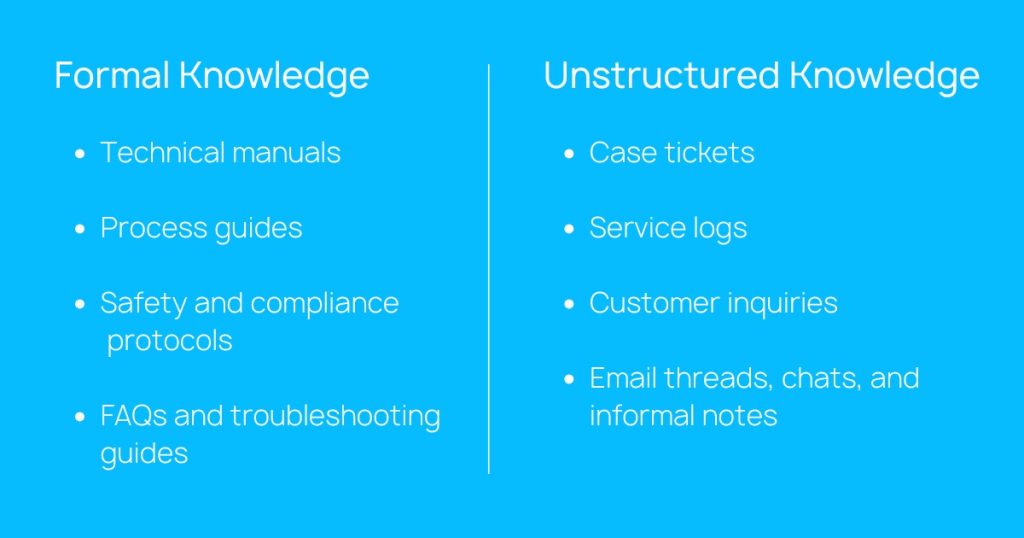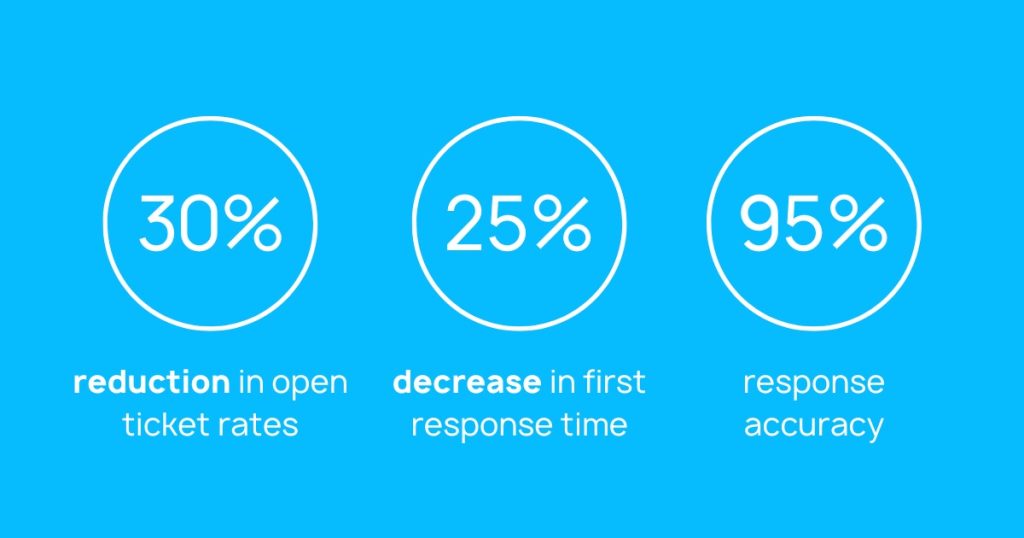AI is reshaping industries, and for manufacturing and industrial companies, harnessing the power of internal knowledge has become vital for operational efficiency and staying ahead of the competition. An AI knowledge base can significantly streamline operations, optimize internal processes, and breathe new life into a business as it seeks to lead the Industry 4.0 revolution.
The knock-on effects are extensive (we’ll speak more about these in the Guide), and it’s no wonder that effectively leveraging AI can potentially boost corporate profits by $4.4 trillion a year.
This comprehensive guide explores the concept of an AI knowledge base, its essential elements, the benefits it offers, its role in the industrial sector, and how to find the right AI knowledge base solution for your organization.
What is an AI Knowledge Base?
To understand what an AI knowledge base is, it’s important first to break down the concept of a traditional knowledge base and then explore how AI enhances its capabilities for modern industrial and manufacturing needs.
A knowledge base of course is a centralized repository of information, designed to store, organize, and manage various forms of data and documentation. In industrial and manufacturing environments, a knowledge base typically holds:
- Technical manuals: Documentation for machinery, tools, and equipment.
- Process guides: Step-by-step instructions for operational procedures.
- Safety and compliance protocols: Essential rules and regulations ensuring that operations are safe and compliant with industry standards.
- FAQs and troubleshooting guides: Common issues and their solutions, aiding both employees and customers.
A well-organized knowledge base is crucial in helping employees and customers quickly find relevant information, enabling smoother operations and better service delivery. Traditionally, knowledge bases rely on manual search methods, meaning users have to navigate through layers of data or use specific keywords to find what they need. This approach, while useful, often proves slow and inefficient, particularly when dealing with complex or technical information.
Formal vs. Unstructured AI Knowledge Base
An effective AI knowledge base must accommodate both formal and unstructured knowledge, each of which plays a critical role in operational efficiency.

- Formal Knowledge: This includes highly structured, official documentation essential for standard operations:
- Technical manuals: Documentation for machinery, tools, and equipment.
- Process guides: Step-by-step instructions for operational procedures.
- Safety and compliance protocols: Regulations ensuring safe, compliant operations.
- FAQs and troubleshooting guides: Frequently encountered issues and solutions, aiding both employees and customers.
- Unstructured Knowledge: This includes data from informal, real-time sources that are often rich with practical insights but traditionally harder to organize:
- Case tickets: Historical records of service requests, technical issues, and resolutions.
- Service logs: Maintenance and service documentation tracking operational health and issues over time.
- Customer inquiries: Questions and support interactions, which can be valuable for identifying recurring issues and enhancing customer support.
- Email threads, chats, and informal notes: Internal communications that can capture important contextual knowledge.
Integrating both formal and unstructured knowledge into an AI-powered system like Korra allows organizations to create a robust knowledge base that delivers timely, relevant answers. This approach not only ensures comprehensive coverage but also enhances search accuracy by making both formal documents and unstructured data instantly accessible. By effectively ingesting both of these knowledge types, organizations unlock actionable insights that drive productivity, operational intelligence, and informed decision-making.
Where an AI-Powered Knowledge Base Comes In
An AI-enabled, or AI-powered knowledge base takes the traditional knowledge base to the next level by integrating artificial intelligence technologies, such as machine learning (ML) and natural language processing (NLP). These enhancements allow for smarter, more efficient retrieval and management of information. Here’s how AI improves a traditional knowledge base:
- Semantic Engines: A semantic engine enhances the AI knowledge base by analyzing the context and meaning behind user queries and the documents within the system. This technology enables the knowledge base to go beyond keyword matching to truly understand the intent of a question, resulting in more precise answers. For example, Korra’s semantic engine processes and aligns related terms and concepts, delivering responses that are contextually relevant even when exact matches aren’t present. This approach drastically improves information retrieval speed and accuracy, particularly for complex, nuanced queries.
- Large Language Models (LLMs): LLMs bring a high degree of contextual understanding and predictive power to knowledge bases, offering responses that mirror human expertise. By leveraging these models, Korra can handle complex, open-ended questions, distilling information from a range of content sources and providing nuanced, multi-faceted answers. LLMs also enable the AI system to provide summaries, generate explanations, and allow follow-up questions, empowering users with deep insights and making it easier for them to access complete information quickly.
- Automated Data Ingestion: The best AI systems can handle vast amounts of structured and unstructured data, from PDFs and spreadsheets to videos and web pages. Korra’s platform, for instance, leverages advanced ingestion technology to transform diverse data types into a cohesive and searchable digital repository.
- Natural Language Processing (NLP): NLP enables users to ask questions in everyday language rather than using specific keywords or technical jargon. This makes it easier for employees on the factory floor or technical support teams to quickly find the information they need without prior knowledge of specialized terminology.
- Machine Learning (ML): With machine learning, an AI knowledge base continually learns from user interactions. As more queries are answered and more data is processed, the system becomes smarter, offering better and more personalized responses over time. Korra’s platform, for example, applies advanced AI algorithms to convert digitized content into actionable insights, driving strategic decision-making.
- Trustworthy, Contextual Responses: Leading AI-powered systems don’t just provide the information requested, but also the context around the data, pulling from multiple sources if needed. Korra delivers a complete discovery experience by offering multi-modal answers, combining insights from all available content types (documents, videos, images, etc.) into one coherent response. Critically, it includes source citation, which ensures the accuracy and integrity of answers.
The outcomes? You can transform your diverse knowledge assets into a cohesive, AI-ready digital repository, driving actionable insights and strategic intelligence. Empower employees, identify new opportunities, optimize processes, and lead your industry with forward-thinking solutions.
Key Advantages of an AI Knowledge Base Over Traditional Systems
- Speed: AI-powered systems like Korra enable quick and accurate retrieval of information, drastically reducing search time.
- Accuracy: Advanced AI engines improve the precision of responses, reducing the likelihood of human error and enhancing decision-making.
- Enriched experience: Unlike static knowledge bases, an AI-enabled system ingests all content types to provide trustworthy and accurate answers that were previously unattainable. It should include source citation, integrated viewers, semantic and GPT engines, and more, to provide a complete discovery experience including multi-modal answers offering the best of all content types.
In essence, an AI knowledge base is an intelligent system designed to store, manage, and retrieve critical information across an organization. Leveraging advanced AI algorithms, this knowledge base continually adds value. This capability is especially important in industries like manufacturing, where accessing detailed technical information, process manuals, and troubleshooting guides can make or break operational efficiency.
Unlike traditional knowledge repositories, AI-driven knowledge bases provide more specific, multimodal, context-aware information, reducing time spent searching for specific answers and enhancing decision-making processes.
Why Is an AI Knowledge Base Critical for Industry 4.0?
As the manufacturing world moves into Industry 4.0, marked by automation and data exchange, companies need quick access to a broad range of operational knowledge. An AI knowledge base plays a pivotal role in digitizing and managing this knowledge, ensuring that companies can quickly and easily access the information they need to keep operations running smoothly, and unearth insights that can push them ahead of competitors.
How Does An AI Knowledge Base Work?
An AI knowledge base operates through three core mechanisms:
- Data Ingestion: The system is fed large amounts of structured and unstructured data, such as PDFs, technical documents, images, and videos. AI algorithms are used to process and categorize the data. Note that only Korra.ai is able to effectively ingest such diverse data types
- Natural Language Processing (NLP): NLP allows the AI knowledge base to understand and interpret user queries, converting them into understandable formats. It also enhances search accuracy, making it easier for users to find relevant information using everyday language rather than technical jargon – and to ask follow-up questions.
- Machine Learning (ML): As users interact with the knowledge base, machine learning models help improve the system’s ability to predict and suggest the most appropriate answers or solutions, based on previous user interactions.
This synergy between data ingestion, NLP, and ML creates an evolving system that continuously updates and refines itself, offering a more dynamic and responsive resource than traditional, static databases.
The Benefits of an AI-Powered Knowledge Base
For industries reliant on accurate information, precision, and efficiency, the benefits of integrating an AI-powered knowledge base are substantial:
- Reduced downtime: With instant access to troubleshooting guides and equipment manuals, technicians can quickly resolve machine faults, reducing production delays.
- Improved decision-making: Having access to real-time, accurate information helps industrial managers make more informed decisions.
- Cost savings: Efficient problem-solving and reduced machine downtime translate into significant cost reductions.
- Enhanced employee training: New employees can access an AI knowledge base to learn procedures and protocols quickly, lowering the need for extensive, on-site training.
- Scalability: As a company grows, the AI knowledge base can easily accommodate larger amounts of information, keeping everything organized and accessible.
A practical example is a recent AI-powered knowledge transformation, led by Korra.
The customer, a global leader in climate control and air treatment solutions, faced difficulties managing extensive product information, leading to high volumes of routine inquiries and diverting product managers and engineers from their core tasks. To address this, they implemented a centralized AI-powered training platform and Korra’s Knowledge Discovery technology, consolidating information from various sources and integrating seamlessly through APIs.
Key Outcomes
- 30% reduction in open ticket rates
- Up to 25% decrease in first response time
- Over 95% response accuracy

The organization also noted:
- Significant reduction in time spent by product managers and engineers on support queries
- Enhanced satisfaction for knowledge managers and end-users
- Increased productivity for support agents, channel partners, and technical teams
This initiative streamlined knowledge access while boosting operational efficiency and user satisfaction across the organization’s support and technical teams.
Types of AI-Powered Knowledge Base Content
AI knowledge bases in industrial settings can host a wide array of content types, tailored to specific industry needs:
- Equipment and maintenance manuals: AI systems can store and quickly retrieve manuals for equipment repair, minimizing production downtime. Leading AI knowledge base solutions can also draw this information from diverse content types such as video, and even present the key timestamped points of the video to the user.
- Process documentation: Manufacturing processes often involve multiple steps and compliance checks. The knowledge base provides workers with immediate access to these instructions.
- Frequently asked questions (FAQs): The AI system continually improves its ability to respond to FAQs based on user queries, making it an ideal tool for customer service and employee training.
- Technical data and specifications: Engineers can access precise machine and material data, improving product development and quality control.
- Safety protocols and compliance information: Ensure that your workforce has access to up-to-date safety guidelines and compliance regulations to avoid accidents and legal risks.
Top AI Knowledge Base Software Solutions
Several leading AI knowledge base platforms cater different needs.
1. Korra
Korra is changing the way businesses access and utilize institutional knowledge. It enables industrial and manufacturing organizations to embrace the Industry 4.0 revolution by unleashing the latent power within internal repositories through advanced AI. The platform ingests all content types to provide trustworthy and accurate responses, offering a complete discovery experience: from quick insights to in-depth answers. Built on a foundation of privacy and with an exceptionally user-friendly onboarding experience and interface, Korra transforms your organization’s knowledge into a strategic asset.
2. Zoho Desk
Known for AI-driven ticket automation and contextual responses.
3. Freshdesk
Offers integrated AI tools for managing customer support inquiries and internal documentation.
4. Intercom
Intercom is a customer support and messaging platform that integrates an AI-powered knowledge base to provide real-time assistance to customers.
5. HubSpot Service Hub
HubSpot Service Hub is part of HubSpot’s suite of customer relationship management (CRM) tools, offering an AI-powered knowledge base specifically designed to streamline customer service and sales enablement.
When it comes to manufacturing and industrial environments, Korra is a clear winner, though the other solutions offer value for organizations in general or those not in this space.
How to Build an AI Knowledge Base
Creating an effective AI knowledge base for your manufacturing or industrial organization involves several steps:
- Identify the purpose: Define the primary goal of the AI knowledge base. Is it for internal use (employee training, process management) or external use (customer service, technical support)?
- Gather and organize content: Collect relevant documentation, including equipment manuals, technical drawings, compliance documents, and other necessary materials. For leading AI knowledge base providers like Korra, you can just connect your data sources (e.g. Dropbox or SharePoint) and the system seamlessly ingests all the content.
- Choose the right platform: Select a platform that integrates well with your existing systems and offers the features you need, such as NLP and ML capabilities.
- Data integration: Ensure that the AI system runs on your data, and only your data. This mitigates the risk of hallucinations or inaccuracies.
Frequently Asked Questions (FAQs)
1. How secure is an AI knowledge base?
AI knowledge bases are often equipped with advanced security measures such as encryption, multi-factor authentication, and data backups to protect sensitive industrial information. Korra, for example, is built around privacy and security, ensuring you’re covered with certifications including GDPR, CCPA, ISO 27001 and SOC2.
2. Can the AI knowledge base be customized for specific industries?
Yes, AI knowledge bases can be tailored to specific sectors, including manufacturing and industrial operations, allowing you to store specialized content like technical specifications, safety protocols, and compliance regulations.
3. How does AI improve search accuracy in a knowledge base?
Using NLP and machine learning algorithms, an AI knowledge base can understand the context of a query, refining results based on user behavior, previous searches, and the specific terminology used in the industry. Korra ensures accuracy with source citation, integrated viewers, semantic and GPT engines, and more.
Enhance Customer Service with an AI Knowledge Base
In addition to internal applications, an AI knowledge base can greatly enhance customer service in manufacturing and industrial environments. With AI, businesses can:
- Provide instant answers to technical inquiries: Customers seeking help with equipment or product usage can receive immediate, AI-driven solutions without waiting for a human representative.
- Personalize customer experiences: AI knowledge bases track user behavior, enabling personalized responses and targeted suggestions.
- Streamline technical support: Complex technical questions can be handled faster by AI, reducing the need for escalation to human experts and improving overall support efficiency.
Conclusion: AI Knowledge Base Solutions Are Critical For Manufacturers and Other Industrial Organizations
As manufacturing and industrial companies strive to increase efficiency and reduce downtime, implementing an AI knowledge base is becoming an essential tool in 2025. Whether it’s for streamlining internal processes, empowering team members, or improving employee training, an AI-powered knowledge base offers tangible benefits that will continue to evolve alongside advancements in AI technology.
By choosing the right platform, integrating it with existing systems, and leveraging the continuous learning capabilities of AI, businesses can unlock new levels of productivity, operational efficiency, and customer satisfaction.
If you’re looking for the leading AI knowledge base for industrial and manufacturing firms, look no further than Korra. With Korra, you can turbocharge Industry 4.0 adoption with a private GPT running exclusively on your database, delivering powerful insights and reliable answers with zero security risks.
Want to learn more? Get in touch with the team today or try it for yourself right now, for free.
